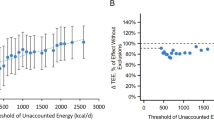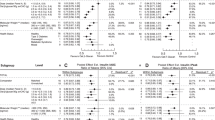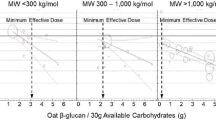Abstract
Varying the macronutrient composition of meals alters acute postprandial responses, but the effect sizes for specific macronutrient exchanges have not been quantified by systematic reviews. Therefore the aim is to quantify the effect size of exchanging fat for carbohydrates in mixed meals on postprandial glucose (PPG), insulin (PPI), triglycerides (PPTG), and free fatty acids (PPFFA) responses by performing a systematic review and meta-analysis of randomized controlled trials. A systematic literature search was undertaken on randomized controlled trials comparing isocaloric high fat with high carbohydrate meals, with comparable protein contents and at least one postprandial glycemic- and one lipid outcome. The outcome data were extracted and expressed as mean postprandial levels over 2 h. Ten studies involving 14 comparisons met the eligibility criteria. Data were available for meta-analysis from 347 participants, consuming mixed meals containing 250–1003 kcal, and total fat contents of 33.3–75.6 percentage of energy (en%) (intervention) versus 0–31.7 en% (control). Each 10en% increase in fat, replacing carbohydrates produced a mean reduction in PPG of 0.32 mmol/l (95% CI −0.64 to −0.00, p = 0.047), a reduction in PPI of 18.2 pmol/l (95% CI −24.86 to −11.54), an increase in PPTG of 0.06 mmol/l (95% CI 0.02 to 0.09, p = 0.004), with no statistically significant effect on PPFFA. Modest exchange of carbohydrates for fats in mixed meals significantly reduces PPG and PPI and increases PPTG responses. The quantitative relationships derived here may be applied to predict responses, and to design and optimize meal macronutrient compositions in dietary intervention studies.
This is a preview of subscription content, access via your institution
Access options
Subscribe to this journal
Receive 12 print issues and online access
$259.00 per year
only $21.58 per issue
Buy this article
- Purchase on Springer Link
- Instant access to full article PDF
Prices may be subject to local taxes which are calculated during checkout





Similar content being viewed by others
References
Pérez-Martínez P, Mikhailidis DP, Athyros VG, Bullo M, Couture P, Covas MI, et al. Lifestyle recommendations for the prevention and management of metabolic syndrome: an international panel recommendation. Nutr Rev. 2017;75:307–26.
US Department of Health and Human Services. Dietary guidelines for Americans 2015–2020. Skyhorse Publishing Inc.; 2017. https://www.skyhorsepublishing.com/9781510726048/dietary-guidelines-for-americans-2015-2020/.
Authority EFSA. EFSA sets European dietary reference values for nutrient intakes 2010.
Shin Y, Park S, Choue R. Comparison of time course changes in blood glucose, insulin and lipids between high carbohydrate and high fat meals in healthy young women. Nutr Res Pract. 2009;3:128–33.
Noakes TD, Windt J. Evidence that supports the prescription of low-carbohydrate high-fat diets: a narrative review. Br J Sports Med. 2017;51:133–9.
Tobias DK, Chen M, Manson JE, Ludwig DS, Willett W, Hu FB. Effect of low-fat diet interventions versus other diet interventions on long-term weight change in adults: a systematic review and meta-analysis. Lancet Diabetes Endocrinol. 2015;3:968–79.
Mansoor N, Vinknes KJ, Veierød MB, Retterstøl K. Effects of low-carbohydrate diets v. low-fat diets on body weight and cardiovascular risk factors: a meta-analysis of randomised controlled trials. Br J Nutr. 2016;115:466–79.
Snorgaard O, Poulsen GM, Andersen HK, Astrup A. Systematic review and meta-analysis of dietary carbohydrate restriction in patients with type 2 diabetes. BMJ Open Diabetes Res Care. 2017;5:e000354.
Meng Y, Bai H, Wang S, Li Z, Wang Q, Chen L. Efficacy of low carbohydrate diet for type 2 diabetes mellitus management: a systematic review and meta-analysis of randomized controlled trials. Diabetes Res Clin Pr. 2017;131:124–31.
Qian F, Korat AA, Malik V, Hu FB. Metabolic effects of monounsaturated fatty acid-enriched diets compared with carbohydrate or polyunsaturated fatty acid-enriched diets in patients with type 2 Diabetes: A systematic review and meta-analysis of randomized controlled trials. Diabetes Care. 2016;39:1448–57.
Lairon D. Macronutrient intake and modulation on chylomicron production and clearance. Atherosclerosis Suppl. 2008;9:45–8.
Alssema M, Schindhelm RK, Dekker JM, Diamant M, Nijpels G, Teerlink T, et al. Determinants of postprandial triglyceride and glucose responses after two consecutive fat-rich or carbohydrate-rich meals in normoglycemic women and in women with type 2 diabetes mellitus: the Hoorn Prandial Study. Metab Clin Exp. 2008;57:1262–9.
Blaak E, Antoine J, Benton D, Björck I, Bozzetto L, Brouns F, et al. Impact of postprandial glycaemia on health and prevention of disease. Obes Rev. 2012;13:923–84.
Moher D, Liberati A, Tetzlaff J, Altman DG. Preferred reporting items for systematic reviews and meta-analyses: the PRISMA statement. PLoS Med. 2009;6:e1000097.
Tushar Mehta. Chart image to data 2012. http://www.tushar-mehta.com/excel/software/chart_image_to_data/. 2017.
Rao G, Lopez-Jimenez F, Boyd J, D’amico F, Durant NH, Hlatky MA, et al. Methodological standards for meta-analyses and qualitative systematic reviews of cardiac prevention and treatment studies: a scientific statement from the American Heart Association. Circulation. 2017;136:e172–e194.
Jadad AR, Moore RA, Carroll D, Jenkinson C, Reynolds DJM, Gavaghan DJ, et al. Assessing the quality of reports of randomized clinical trials: is blinding necessary? Control Clin Trials. 1996;17:1–12.
Brouns F, Bjorck I, Frayn K, Gibbs A, Lang V, Slama G, et al. Glycaemic index methodology. Nutr Res Rev. 2005;18:145–71.
Johnson RA, Wichern DW. Applied multivariate statistical analysis. Prentice hall Upper Saddle River, NJ; 2002.
Ras RT, Hiemstra H, Lin Y, Vermeer MA, Duchateau GS, Trautwein EA. Consumption of plant sterol-enriched foods and effects on plasma plant sterol concentrations–a meta-analysis of randomized controlled studies. Atherosclerosis. 2013;230:336–46.
IBM Corp. IBM SPSS statistics for Windows. 2017.
Dandona P, Ghanim H, Abuaysheh S, Green K, Batra M, Dhindsa S, et al. Decreased insulin secretion and incretin concentrations and increased glucagon concentrations after a high-fat meal when compared with a high-fruit and-fiber meal. Am J Physiol-Endocrinol Metab. 2014;308:E185–E191.
Haimoto H, Sasakabe T, Umegaki H, Wakai K. Acute metabolic responses to a high-carbohydrate meal in outpatients with type 2 diabetes treated with a low-carbohydrate diet: a crossover meal tolerance study. Nutr Metab. 2009;6:52.
Jung S, Kim M, Park T, Kim Y, Song WO, Chae S. Rice-based Korean meals (bibimbap and kimbap) have lower glycemic responses and postprandial-triglyceride effects than energy-matched Western meals. J Ethn Foods. 2015;2:154–61.
El Khoury D, Hwalla N, Frochot V, Lacorte J, Chabert M, Kalopissis AD. Postprandial metabolic and hormonal responses of obese dyslipidemic subjects with metabolic syndrome to test meals, rich in carbohydrate, fat or protein. Atherosclerosis. 2010;210:307–13.
Meng H, Matthan NR, Ausman LM, Lichtenstein AH. Effect of macronutrients and fiber on postprandial glycemic responses and meal glycemic index and glycemic load value determinations. Am J Clin Nutr. 2017;105:842–53.
Schneeman BO, Burton-Freeman B, Davis P. Incorporating dairy foods into low and high fat diets increases the postprandial cholecystokinin response in men and women. J Nutr. 2003;133:4124–8.
Van Amelsvoort J, Van Stratum P, Kraal J, Lussenburg R, Dubbelman G. Minor difference in postprandial responses of men between starch and sugar when replacing fat in a normal meal. Br J Nutr. 1990;63:37–51.
Vanschoonbeek K, Lansink M, Van Laere K, Senden J, Verdijk L, Van Loon L. Slowly digestible carbohydrate sources can be used to attenuate the postprandial glycemic response to the ingestion of diabetes-specific enteral formulas. Diabetes Educ. 2009;35:631–40.
Yokoyama J, Someya Y, Yoshihara R, Ishii H. Effects of high-monounsaturated fatty acid enteral formula versus high-carbohydrate enteral formula on plasma glucose concentration and insulin secretion in healthy individuals and diabetic patients. J Int Med Res. 2008;36:137–46.
Nielsen ML, Pareek M, Leósdóttir M, Eriksson K, Nilsson PM, Olsen MH. One-hour glucose value as a long-term predictor of cardiovascular morbidity and mortality: the Malmö Preventive Project. Eur J Endocrinol. 2018;178:225–36.
Mora S, Chang CL, Moorthy MV, Sever PS. Association of nonfasting vs fasting lipid levels with risk of major coronary events in the anglo-scandinavian cardiac outcomes trial–lipid lowering arm. JAMA Int Med. 2019;179:898–905.
Emerson SR, Haub MD, Teeman CS, Kurti SP, Rosenkranz SK. Summation of blood glucose and TAG to characterise the ‘metabolic load index’. Br J Nutr. 2016;116:1553–63.
Karpe F, Dickmann JR, Frayn KN. Fatty acids, obesity, and insulin resistance: time for a reevaluation. Diabetes. 2011;60:2441–9.
Laaksonen DE, Nyyssönen K, Niskanen L, Rissanen TH, Salonen JT. Prediction of cardiovascular mortality in middle-aged men by dietary and serum linoleic and polyunsaturated fatty acids. Arch Intern Med. 2005;165:193–9.
Riccardi G, Rivellese AA, Giacco R. Role of glycemic index and glycemic load in the healthy state, in prediabetes, and in diabetes. Am J Clin Nutr. 2008;87:269S–274S.
Wolever TM, Bolognesi C. Source and amount of carbohydrate affect postprandial glucose and insulin in normal subjects. J Nutr. 1996;126:2798–806.
Monfort-Pires M, Delgado-Lista J, Gomez-Delgado F, Lopez-Miranda J, Perez-Martinez P, Ferreira S. Impact of the content of fatty acids of oral fat tolerance tests on postprandial triglyceridemia: systematic review and meta-analysis. Nutrients. 2016;8:580.
Perez-Martinez P, Ordovas JM, Garcia-Rios A, Delgado-Lista J, Delgado-Casado N, Cruz-Teno C, et al. Consumption of diets with different type of fat influences triacylglycerols-rich lipoproteins particle number and size during the postprandial state. Nutr Metab Cardiovasc Dis. 2011;21:39–45.
Zeevi D, Korem T, Zmora N, Israeli D, Rothschild D, Weinberger A, et al. Personalized nutrition by prediction of glycemic responses. Cell. 2015;163:1079–94.
Lopez-Miranda J, Williams C, Lairon D. Dietary, physiological, genetic and pathological influences on postprandial lipid metabolism. Br J Nutr. 2007;98:458–73.
Wu BN, O’Sullivan AJ. Sex differences in energy metabolism need to be considered with lifestyle modifications in humans. J Nutr Metab. 2011;2011:391809.
Shafaeizadeh S, Muhardi L, Henry C, van de Heijning B, van der Beek E. Macronutrient composition and food form affect glucose and insulin responses in humans. Nutrients. 2018;10:188.
Acknowledgements
The authors thank Harry H Hiemstra, Ewoud A Schuring, Carolien Ruijgrok for their statistical support.
Author information
Authors and Affiliations
Corresponding author
Ethics declarations
Conflict of interest
At the time this research was carried out, MA, EAT, DJM, AG, MAV were employees of Unilever, which produces and markets consumer food products, and AK was an MSc student at Unilever and Wageningen University. EvdB is an employee of Danone Nutricia Research.
Additional information
Publisher’s note Springer Nature remains neutral with regard to jurisdictional claims in published maps and institutional affiliations.
Supplementary information
Rights and permissions
About this article
Cite this article
Kdekian, A., Alssema, M., Van Der Beek, E.M. et al. Impact of isocaloric exchanges of carbohydrate for fat on postprandial glucose, insulin, triglycerides, and free fatty acid responses—a systematic review and meta-analysis. Eur J Clin Nutr 74, 1–8 (2020). https://doi.org/10.1038/s41430-019-0534-6
Received:
Revised:
Accepted:
Published:
Issue Date:
DOI: https://doi.org/10.1038/s41430-019-0534-6



